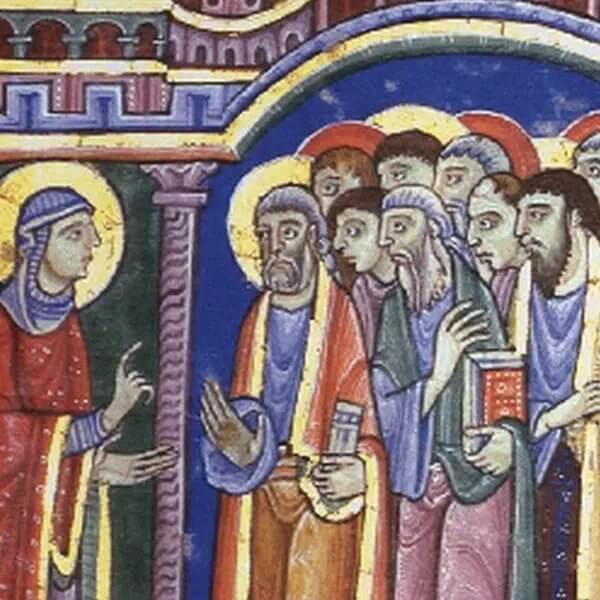
First Sermon
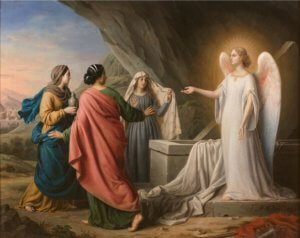 On the first day of the week, at early dawn, the women who had come with Jesus from Galilee came to the tomb, taking the spices that they had prepared. Surely the women had some precious nard with them to prepare Jesus’ body in the tomb, like we smelled several weeks ago. I have some nard with me today if any of you would like to be reminded of that holy scent. Last week on Palm Sunday, Luke’s passion narrative ended with Jesus’ crucifixion at Golgotha, with all of Jesus’ acquaintances, including the women who had followed him from Galilee, standing at a distance, watching these things. The women — all good Jews — honored the Sabbath from sundown Friday through sundown Saturday, so they set out early Sunday morning to prepare Jesus’ body for the tomb.
On the first day of the week, at early dawn, the women who had come with Jesus from Galilee came to the tomb, taking the spices that they had prepared. Surely the women had some precious nard with them to prepare Jesus’ body in the tomb, like we smelled several weeks ago. I have some nard with me today if any of you would like to be reminded of that holy scent. Last week on Palm Sunday, Luke’s passion narrative ended with Jesus’ crucifixion at Golgotha, with all of Jesus’ acquaintances, including the women who had followed him from Galilee, standing at a distance, watching these things. The women — all good Jews — honored the Sabbath from sundown Friday through sundown Saturday, so they set out early Sunday morning to prepare Jesus’ body for the tomb.
Setting the women apart is a theme in Luke’s gospel. Sometimes they are named individually as they are in today’s passage: Mary Magdalene, Joanna, Mary the mother of James, and the other women with them. That’s no fewer than five women right there, although we don’t know that there weren’t more. Women are identified and set apart with increasing frequency as the action moves toward Jerusalem and the cross, so that we’ll notice them when it’s time. And now, on Easter morning, it’s time! The women arrive at the tomb, discover it is empty, and everything is changed.
Why the Women?
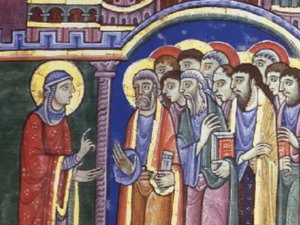 So why did the women discover that Jesus rose from the dead? It’s like that in each of the four gospels, with the women carrying the news of the empty tomb back to the remaining eleven disciples. The disciples, for their part, respond in various levels of disbelief and even disregard. Homiletics professor Tom Long identifies the women’s astonishing Easter morning announcement as the first Christian sermon ever preached. This Easter news is the starting point of all Christian preaching. I have to say that the disciples’ response is not very reassuring to a preacher, and particularly a woman preacher — particularly to me.
So why did the women discover that Jesus rose from the dead? It’s like that in each of the four gospels, with the women carrying the news of the empty tomb back to the remaining eleven disciples. The disciples, for their part, respond in various levels of disbelief and even disregard. Homiletics professor Tom Long identifies the women’s astonishing Easter morning announcement as the first Christian sermon ever preached. This Easter news is the starting point of all Christian preaching. I have to say that the disciples’ response is not very reassuring to a preacher, and particularly a woman preacher — particularly to me.
Did the disciples leap to their feet with the women’s news that the tomb was empty? Did they shout alleluia, and run as fast as they could to Joseph of Aramathea’s rock cut tomb where Jesus had been laid? They did not, of course — except for Peter, who’s never afraid to go all in for the gospel, even if he might look a little foolish doing it. While the disciples’ dismissal of the good news varies in different translations of Luke’s gospel, the theme is consistent: The women’s good news seemed to them like “an idle tale,” “empty talk,” “a silly story,” “a foolish yarn,” “utter nonsense,” “sheer humbug.“
Why is this first Christian sermon so quickly dismissed, even by the disciples — Jesus’ closest friends and followers — whom you’d think would be overjoyed to accept it? Do the disciples reject the message because it’s carried by women? That’s a possibility, but I think it’s way too simple an answer. After all, Peter, the rock on which Jesus founded his church, bolts to his feet, runs to the tomb, and is a believer on the spot.
Women’s Connection
I think that the women have definitely been identified and set apart, but for reasons much more nuanced and subtle than sexism. First, preparing bodies for burial in many times and cultures is tender, loving, motherly, and achingly sad work, even more difficult after witnessing the loved one’s brutal and intentional killing. So, especially in that time and place the women would have been the expected actors in the scene.
Also, there’s something specifically important about women’s connection with building and teaching faith, the role that women are given as the first preachers of the good news in each of the four gospels. In her excellent book Band of Angels, New Testament scholar Kate Cooper thinks beyond gender to the almost universal role of women, specifically and particularly in the first few centuries of the Common Era. Women shaped community, culture, belief, and civilization itself by rearing families, which included moral and ethical development and forming individual and community belief through teaching and storytelling — forming humanity from birth.
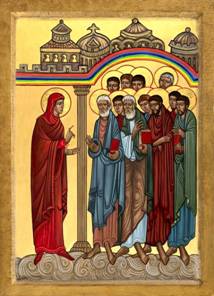 What if the women found the empty tomb — and preached the first sermon of the resurrection to the disbelieving disciples — to separate clearly the gospel message from politics and power, instead weaving it into the very fabric of families and communities through nurturing, feeding, supporting, and storytelling? During Eastertide, we’ll see many women in the Book of Acts — Lydia, the seller of purple cloth, Dorcas, Mary, Rhoda, Prisca, and others. Women were the heads of large households — even households that were leaders in commerce, like small businesses. Early Christians worshiped in house churches, made up of extended families, and when the head of the household converted, the whole household converted along with her. Notice how many of the Apostle Paul’s letters begin with greetings to women, and to their households. The gospel of love is a tender and powerful message, raised up from the grassroots in families and communities, and not legislated or enforced top down through empire. When the gospel message is co-opted by power, its essential nature changes. The Crusades, colonialism, many wars, and slavery are just a few examples of how Christianity is distorted when it is appropriated and deployed by power, rather than held and nurtured in the bosom of the community.
What if the women found the empty tomb — and preached the first sermon of the resurrection to the disbelieving disciples — to separate clearly the gospel message from politics and power, instead weaving it into the very fabric of families and communities through nurturing, feeding, supporting, and storytelling? During Eastertide, we’ll see many women in the Book of Acts — Lydia, the seller of purple cloth, Dorcas, Mary, Rhoda, Prisca, and others. Women were the heads of large households — even households that were leaders in commerce, like small businesses. Early Christians worshiped in house churches, made up of extended families, and when the head of the household converted, the whole household converted along with her. Notice how many of the Apostle Paul’s letters begin with greetings to women, and to their households. The gospel of love is a tender and powerful message, raised up from the grassroots in families and communities, and not legislated or enforced top down through empire. When the gospel message is co-opted by power, its essential nature changes. The Crusades, colonialism, many wars, and slavery are just a few examples of how Christianity is distorted when it is appropriated and deployed by power, rather than held and nurtured in the bosom of the community.
And while ancient Jewish texts prohibited accepting evidence from women because of the “levity and temerity of their sex,” I think there’s more to the disciples’ dismissal of the women’s news of the empty tomb than either gender discrimination or the separation of Jesus’ gospel of love from politics and power. Isn’t that just how many of us respond? We don’t listen, we disregard, we try to tame, domesticate, or rationalize the news, because the resurrection is a really bold claim, and taking it seriously is risky business.
Risk Letting the Gospel Affect Our Lives
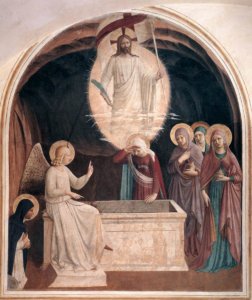 Putting our trust in this first Christian sermon from the women at the empty tomb — or any one preached from this essential core message ever — means taking the risk of letting the gospel affect our lives. This is terrifying — risky business indeed. Even Mary Magdalene, Joanna, Mary the mother of James, and the other women with them respond in terror and bow their faces to the ground when the two angels in dazzling white tell them that Jesus is alive.
Putting our trust in this first Christian sermon from the women at the empty tomb — or any one preached from this essential core message ever — means taking the risk of letting the gospel affect our lives. This is terrifying — risky business indeed. Even Mary Magdalene, Joanna, Mary the mother of James, and the other women with them respond in terror and bow their faces to the ground when the two angels in dazzling white tell them that Jesus is alive.
As Wheaton College New Testament professor Esau McCaulley, wrote in a 2021 New York Times opinion piece, they are terrified because they recognize that God’s power is on the loose and might very well unsettle the world. Author Annie Dillard also wondered whether modern Christians really understood the unbridled power of the gospel of love.
The churches are children playing on the floor with their chemistry sets, mixing up a batch of TNT [on…] Sunday morning[s]. It is madness to wear ladies’ straw hats and velvet hats to church; we should all be wearing crash helmets. Ushers should issue life preservers and signal flares; they should lash us to our pews.
 I’m not saying you’re not safe here at church any more than the women preaching the first sermon were saying that the empty tomb wasn’t good news. I’m saying that the potential of our community’s response to that good news is powerful, and we’ve seen it here at Emmanuel. On Easter Monday, our new Emmanuel and Newport Classical sign sprang up at the corner among the daffodils. Our haloed — hallowed — ribbons, which fluttered on the fence through the 40 days of Lent, are now the multicolored, interwoven foundation of our community’s identity as one body in Christ, spread on our altar at Easter.
I’m not saying you’re not safe here at church any more than the women preaching the first sermon were saying that the empty tomb wasn’t good news. I’m saying that the potential of our community’s response to that good news is powerful, and we’ve seen it here at Emmanuel. On Easter Monday, our new Emmanuel and Newport Classical sign sprang up at the corner among the daffodils. Our haloed — hallowed — ribbons, which fluttered on the fence through the 40 days of Lent, are now the multicolored, interwoven foundation of our community’s identity as one body in Christ, spread on our altar at Easter.
As we walk through the 50 days of Easter, let’s wonder together, and with God, how our lives are changed by that foundation. Lots of you asked how we’d get all the different lengths, colors, widths, and textures woven together into one cloth. I can’t tell you that the multicolored altar cloth of our dreams is orderly and uniform. But the haloed — hallowed — ribbons of our lives are indeed woven into the fabric of our altar cloth, just as we, with all of our diversity, are woven together into the fabric of our community. Can we take the risk together of letting the gospel affect our lives?
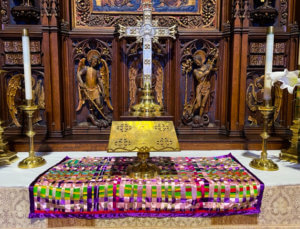
Alleluia, Christ is risen!
The Lord is risen indeed. Amen
